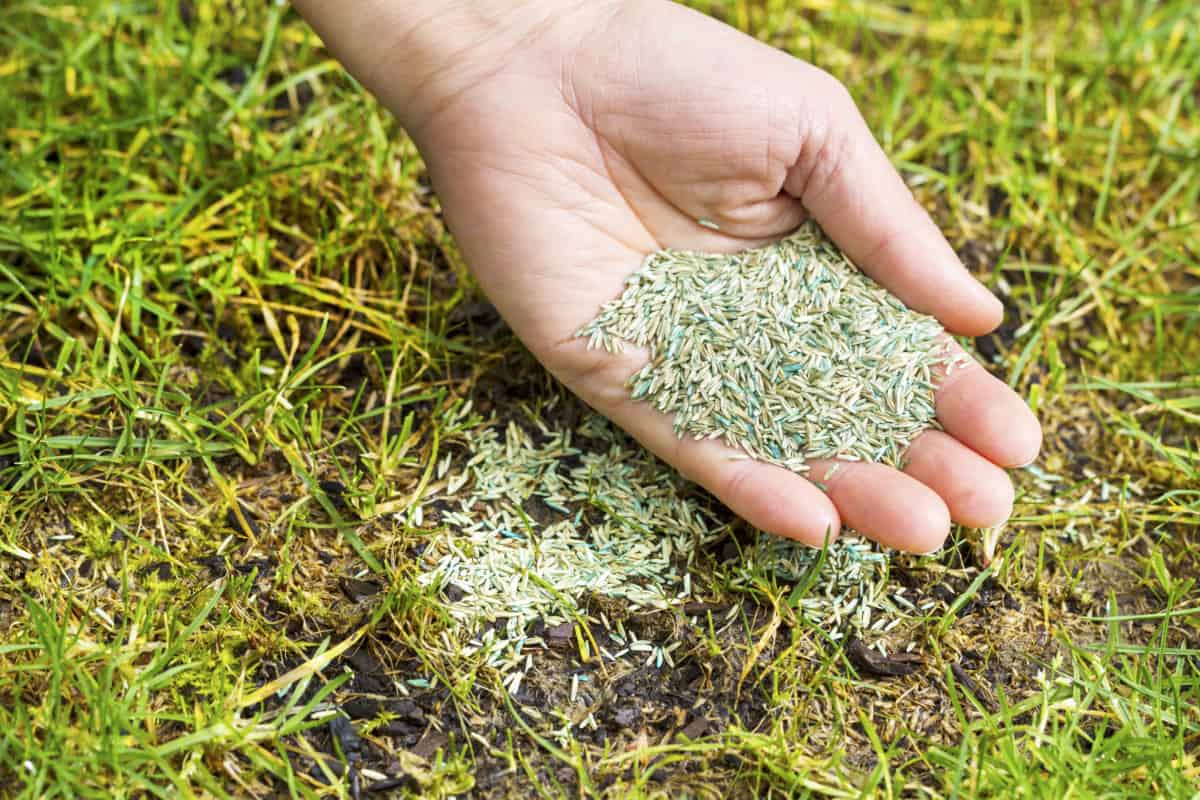You hardly ever see chicken coops with a nice, green, and lush layer of grass covering the ground. Why is this? Is it because people do not plant grass for chickens? Is it because the chickens destroy the grass, even if it is planted? Or is it because the chickens eat the grass seeds before they have a chance to take root and grow?
Chickens do eat most types of grass seeds. They are nutritional for chickens as long as they are organic so that they can be part of a chicken’s staple diet. Chickens will eat grass seeds when they find them, so if you are trying to grow your lawn, you need to keep your chickens away.
Chickens will eat grass seeds when they see them. This article looks at how grass seeds can be used in a chicken’s diet and how their affinity for grass seeds can be a problem.
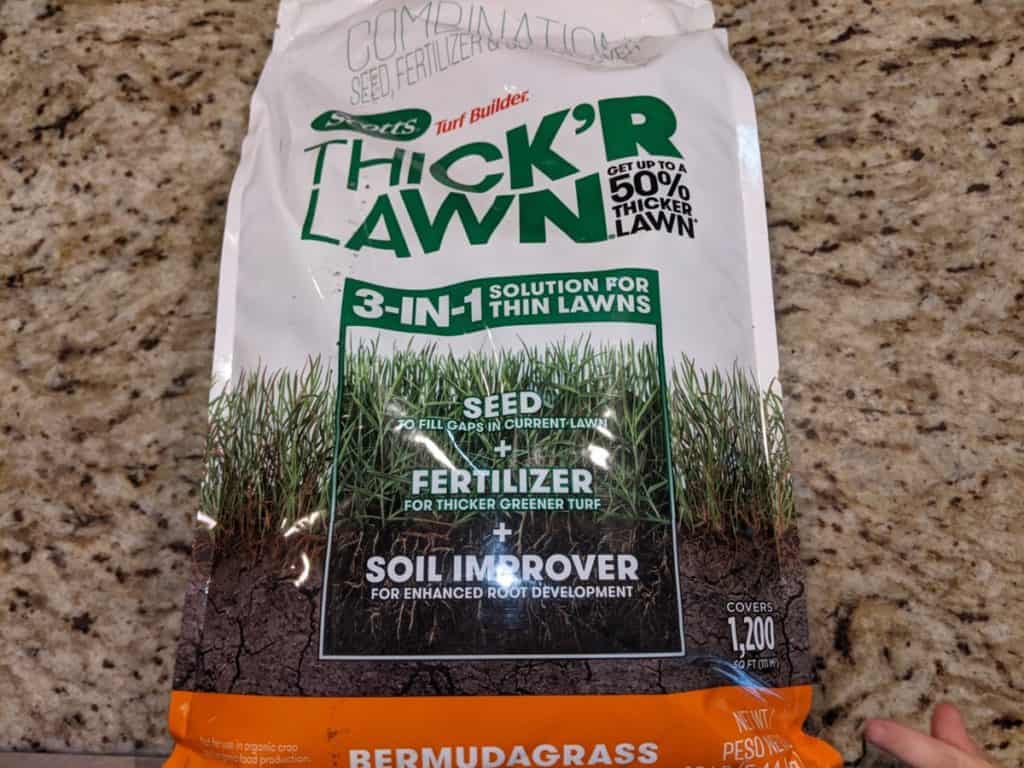
Is Grass Seed Toxic For Chickens?
Grass seeds are not toxic for chickens to eat. In fact, grass seeds are a very good nutritional source for chickens.
However, some grass seeds are treated with chemicals, and these chemicals are potentially toxic for your chickens. The grass seed you buy from Home Depot or other stores has a chemical coating around the seed, you do not want your chickens to eat this. This is why I kept my chickens away from the grass seed I spread out during the spring until it sprang up.
Suppose you would like to feed your chickens grass seeds as part of their daily diet, or you are going to plant a new lawn that your chickens might be able to access. In both of these cases, you should make sure that the grass seeds that you purchase are completely organic and untreated with chemicals.
Another potentially hazardous related substance is the fertilizer that is used to help grass seeds take root. If you use synthetic fertilizers, then you have to make sure that your chickens cannot access your lawn. However, the best option is to source and use organic fertilizers.
What Grass Seeds Can Chickens Eat?
Chickens can eat most types of grass seeds, including the seeds of the plants listed in the table in the section on grasses that chickens can eat.
Are There Any Grass Seeds That Chickens Will Not Eat?
Chickens, on the whole, are not fussy eaters, so there should not be any grass seeds that your chickens will not eat.
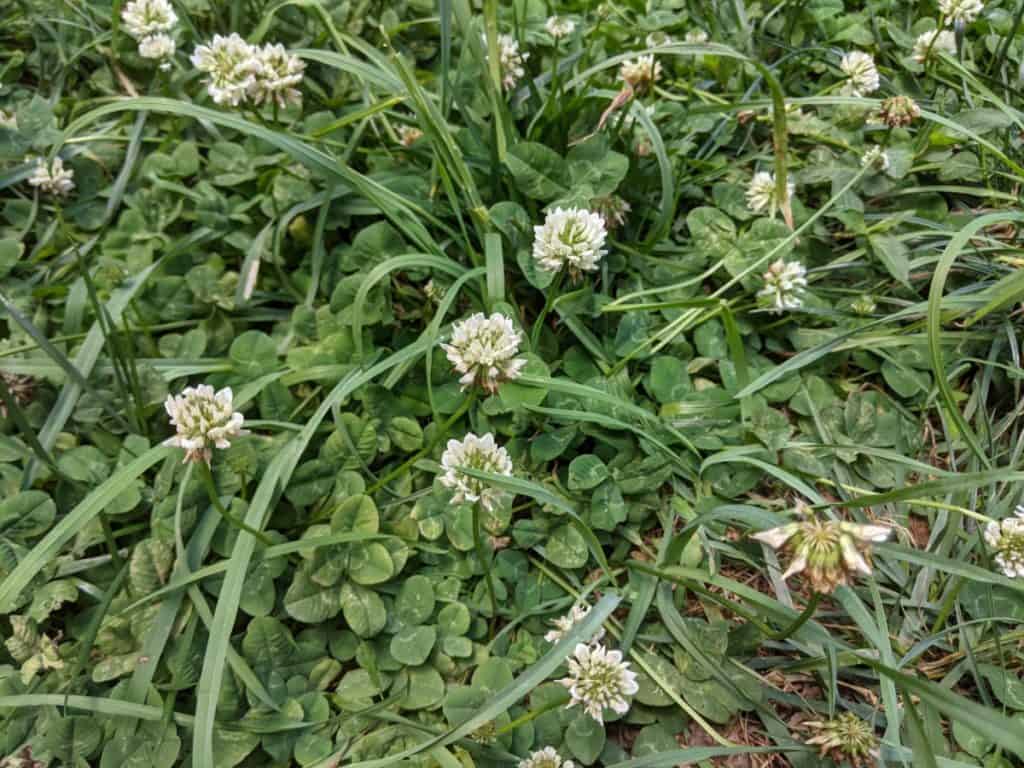
What Grasses Can Chickens Eat?
Chickens do not just eat grass seeds; they will also eat the grass itself.
If you are planting grass specifically for your chickens to eat, then you should use a mixture of grass seeds (85% to 90%), leguminous plant seeds (2%), clover (2% to 4%), and herb seeds (2%) to make sure that the grass can be a balanced nutritional source for your chickens.
You can buy pre-mixed bags of seeds. Just make sure they follow the percentage guidelines provided above. Alternatively, you can mix your own seeds using the guidelines and the following table of the best grasses to plant for chickens.
| PLANT NAME | PLANT TYPE | PERCENTAGE IN A MIX |
| Ryegrass | Grass | 30 to 35 |
| Sheep’s Fescue | Grass | 20 |
| Hard Fescue | Grass | 20 |
| Red Creeping Fescue or Strong Fescue | Grass | 15 to 20 |
| Chewings Fescue | Grass | 15 |
| Bitter Blue Lupin | Leguminous plant | 2 |
| Alfalfa grass (lucerne) | Leguminous plant | 2 |
| Birdsfoot Trefoil | Leguminous plant | 2 |
| White Clover | Clover | 2 |
| Red Clover | Clover | 2 |
| Agricultural Mustard | Herb | 2 |
| Vetch Forage Herb | Herb | 1.4 |
| Burnet Forage Herb | Herb | 0.8 |
| Chicory Forage Herb | Herb | 0.4 |
| Ribgrass Forage Herb | Herb | 0.2 |
| Yarrow Forage Herb | Herb | 0.2 |
Should I plant Grass, Or Does My Chicken Prefer Dirt?
Below are the benefits and drawbacks of grass and dirt. However, your chickens will probably prefer a combination of a variety of grasses and dirt to roam over and scratch through.
Benefits Of Grass For Chickens
- The grass itself is a source of food for your chickens
- Your chickens will also eat the grass seeds that are produced
- Grass provides the ground with protection from the sun so that it does not become compacted.
- Loose soil beneath grass is the perfect place for grubs and worms, a favorite food source for chickens
- Insects will also be attracted to the grass, so chickens can eat those too
- Chicken poop can serve as a natural fertilizer for the grass
Drawbacks Of Grass For Chickens
- If you have too many chickens concentrated in one area, the amount of poop that they produce can become harmful to the grass
- The most significant downside to providing your chickens with grass, and that is the fact that they will very quickly destroy it, and you will have to move them to a new spot and replant the old area
Benefits Of Dirt For Chickens
- Dirt is a much lower-maintenance option for a chicken coop
- Chickens often enjoy having a sand bath
- They have direct access to the ground, in which they can forage for grubs and worms
Drawbacks Of Dirt For Chickens
- The sun can dry out the exposed ground and cause it to become compacted, and the compacted soil is difficult for a chicken to dig into
- Dirt contains fewer insects and worms for the chickens to eat
- Dirt can quickly become muddy in rainy weather, and it is never healthy for animals to stand around in mud
Will Chickens Destroy My Lawn?
The short answer is yes; chickens will destroy your lawn. However, there are some variables that influence the rate and severity of this damage.
The Number Of Chickens
The more chickens you have, the more chickens there are to scratch up your grass, eat it, and also eat the grass seeds before they can take root and replace the scratched-up grass.
Furthermore, chicken poop can burn your grass with its high nitrogen content if there is too high a volume. When you have more chickens, there is more chicken poop.
The Area Of Lawn To Which The Chickens Have Access
If your chickens have access to a small area of lawn, then they will all be scratching and eating at that area of the lawn, increasing the rate of destruction.
Once again, chicken poop is also a factor. The smaller the lawn area, the more concentrated the poop, and so grass damage is more likely to occur and in a shorter amount of time.
The Type Of Grass You Plant
If you plant grass that takes a long time to become established, your chickens are more likely to uproot it before it can mature and spread. Furthermore, some grasses, like ryegrass, are just tougher overall and so will last longer.
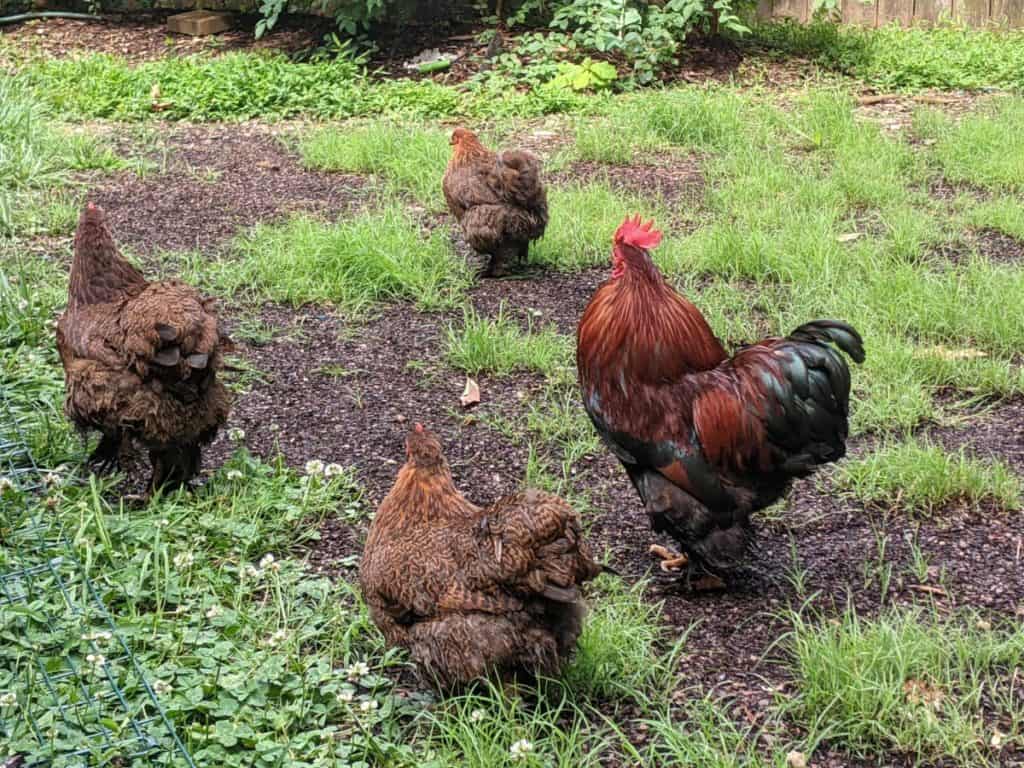
How Do You Stop Chickens From Eating Grass Seed?
If you want to stop your chickens from eating your grass seed, then the best option is to keep them permanently away from your lawn.
How Do You Stop Chickens From Destroying Your Lawn
1. Choose The Correct Grass
To stop chickens from destroying your lawn, you need to start by choosing the right type of grass to plant.
As mentioned previously, ryegrass is a great option because it is a hardy grass that will not easily be ripped up by the chicken’s scratching feet.
Other good options are the different Fescues because they are fast-growing grasses that require less time to become established.
2. Only Put Chickens On Established Lawn
If you have freshly sown lawn, then you should keep your chickens away until it the grass seeds have taken root and the ground is covered.
3. Have The Correct Chicken To Area Ratio
Fewer chickens over a larger area of lawn will minimize the damage they do and allow the grass to be replaced. This will also mean that the chicken poop is spread out over a larger area and can act as fertilizer without burning the grass.
4. Rotate Areas
If you have your chickens in a coop, then you should opt for a portable coop like the Omlet Eglu. When the grass in the coop starts looking patchy, then move it over a different area and re-seed the last spot.
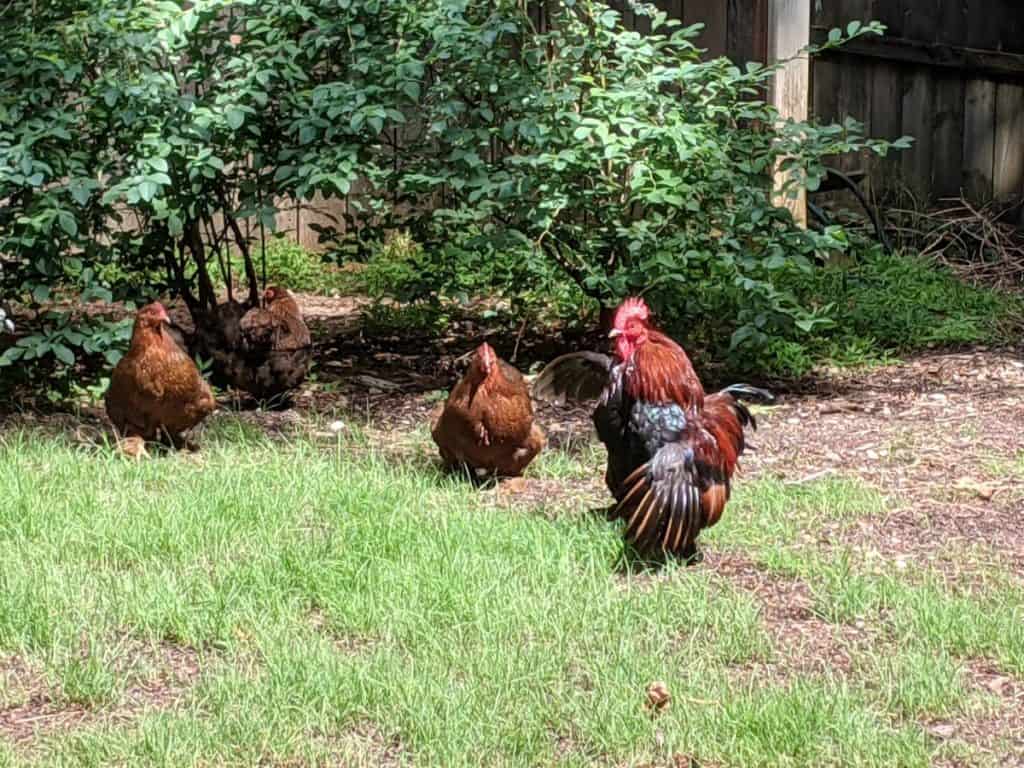
Conclusion
Chickens can and will eat grass seeds. They can act as a nutritional source for your chickens. Ryegrass, wheatgrass, Fescues, alfalfa, etc., are all great grasses for chickens to eat.
However, in eating the seeds, they prevent the grass from growing. If you want to give your chickens grass, then you need to choose strong, fast-growing grass and keep your chickens away until the lawn is established.
Another way to stop chickens from destroying your grass is to make sure that you have a good area to chickens ratio and rotate where your chickens go to allow the grass to regrow.

